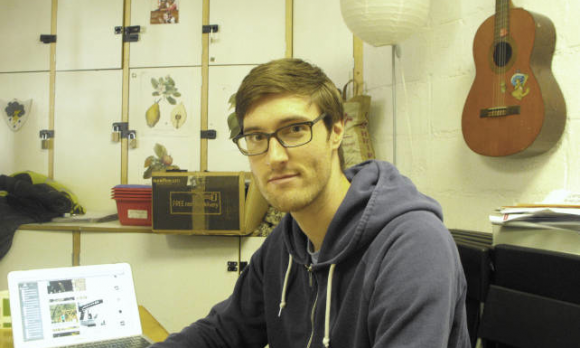Generation Hackney
Sam Hooper visits founder Richard Hearn who is fighting to save a lost generation
The thirty-year-old founder of Generation Hackney, Richard Hearn, rises eagerly to greet us as we arrive, picking his way through the studio he shares with an eclectic mix of social entrepreneurs earnestly tapping away on laptops, sipping coffee or mending bicycles in the corner.
From his hotdesk in Hackney, armed only with a MacBook, a mobile phone and his unshakeable optimism, Hearn is trying to improve the lives of disaffected school-leavers struggling with the transition from education into work. “I left my job (working as a volunteer mentor coordinator for a large charity) in November and just went for it. And this is where I am now,” he explains.
Launched in November 2013, Generation Hackney aims to improve the prospects of at-risk young people by teaching them employability skills such as time management and communication before offering them a series of short-term work placements. Hearn believes that the 20 per cent youth unemployment rate and 72 per cent youth reoffending rate can be reduced if struggling young people and first-time offenders are shown that stable paid employment is a positive and realistic option.
Those enrolled on the scheme have a consultation to review their skills, interests and motivations before sitting a two-day course on workplace behaviour. They are then offered work experience at a range of local businesses who have partnered with Generation Hackney to take on a young trainee for one day a week over a six-week period. Hearn’s current business partners include The Hair Project, Hackney Homes and Jump Programmes.
Hearn believes that while many young people with troubled educational backgrounds are sceptical of work and pessimistic about their employment prospects, encouraging them to look at their life experience in a more positive way can completely change their attitude.
“We had a young person who was done for selling drugs, but there were business skills in there. You know how much to charge, you know where to find your market. It’s trying to get them to think out of the box. There are skills in here that an employer can benefit from,” he says, adding, “A lot of these young people are big risk takers and are naturally quite rebellious, which is an entrepreneurial skill to have.”
It is this personalised attention that takes into account their individual interests and experiences that Hearn predicts will distinguish Generation Hackney as an innovative new model. Hearn previously worked in the private sector before spending several years as a co-ordinator of volunteer mentors, but he became disillusioned at the inability of larger organisations to provide the attentive, personalised service that many young people need.
But despite Hearn’s background and experience – which includes time in the private sector and five years working with at-risk youth at crime reduction charity Nacro – securing grants, clients and business partners for his new venture is very challenging, so he is bearing the cost of the pilot himself.
“There are options [for finance] but it doesn’t help when you’re brand new. Some places will invest in pilots, some won’t. They want to know what the impact will be. So most of the pilot I am doing at no charge,” Hearn admits. “The initial funding has come from money that I saved up. Thankfully my overheads are low, it’s just my time, but I am feeling the squeeze at the moment. But hopefully things are starting to look up on that front.”
While Hearn credits the School for Social Entrepreneurs for giving him the technical skills to succeed, his infectious enthusiasm and optimism cannot be learned – and these attributes have been tested to the limit in the five months since Generation Hackney was launched.
On the first day of the inaugural training course – the culmination of months of hard work and preparation – none of the fifteen young people showed up for the session. Hearn attributes this to a miscommunication, but it is also an occupational hazard of working with clients from varied and often less stable backgrounds. In another setback, the educational charity from which Hearn was getting his referrals recently announced its imminent closure.
But where others might see insurmountable obstacles, Hearn looks at the potential for new business partners, new referral organisations and new opportunities: “There are plenty of places where I can get young people so it’s not too much of a stress, but that was a setback … I need to build up my links so that I can keep going, keep delivering.”
Hearn frequently updates the project’s Generation Me blog, giving readers a remarkably honest account of the challenges faced by a first-time social entrepreneur and the hard work required to have a chance of success.
The first group of young people are scheduled to begin their training in April, and Hearn is focussing on turning his vision into a positive experience for them: “I have ideas which my experience tells me can work,” he emphasises, “and I’m willing to take a risk to make them happen.”
For more information on Generation Hackney, visit www.generationmeblog.com















Write Your Comment